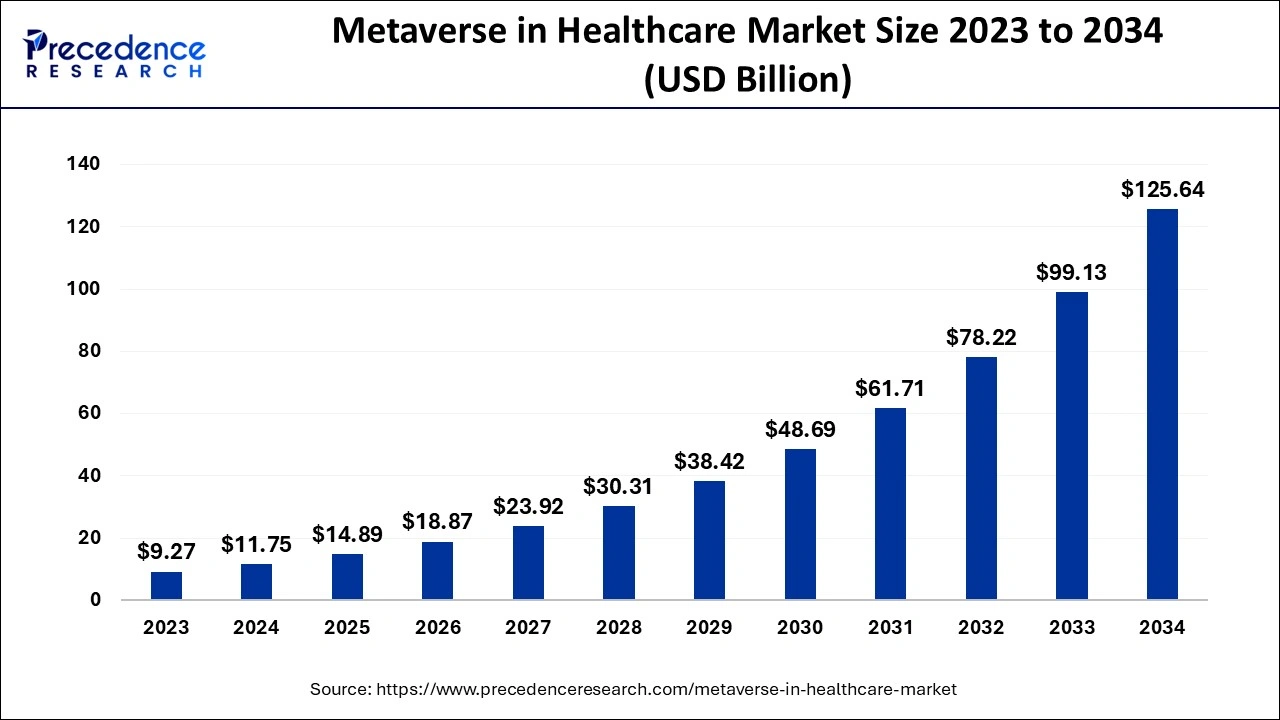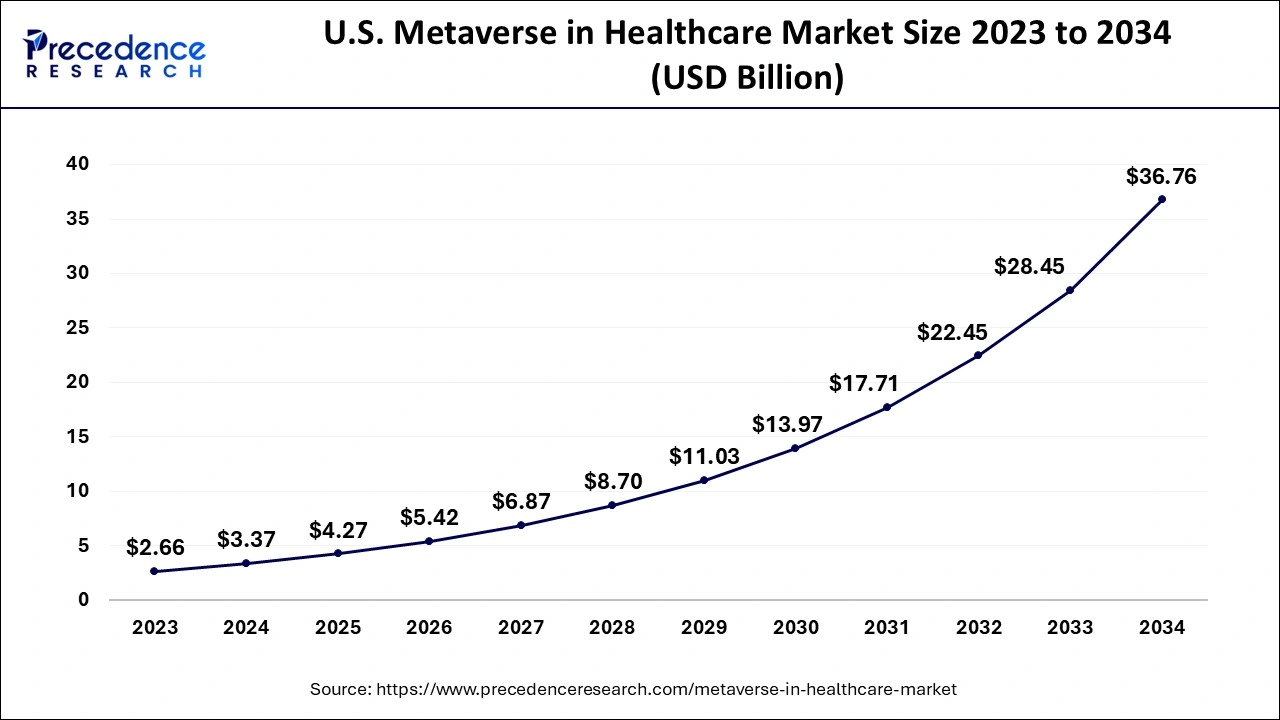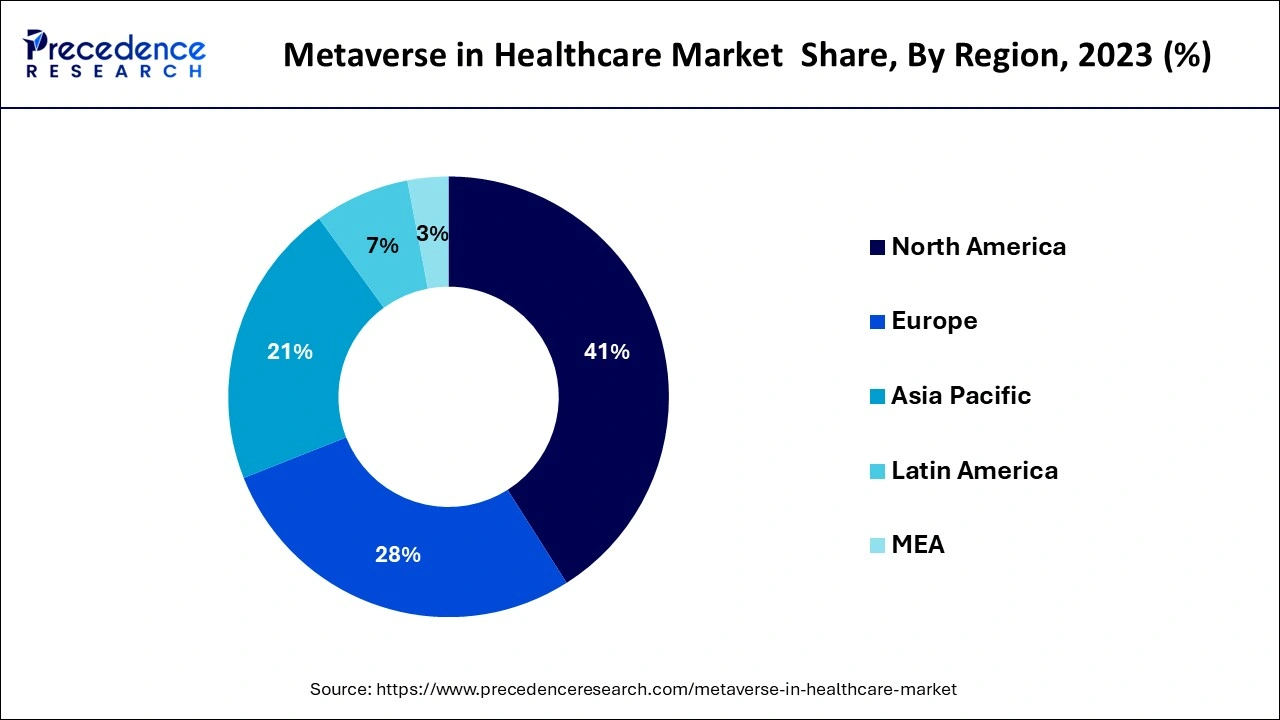February 2025
The global metaverse in healthcare market size accounted for USD 11.75 billion in 2024, grew to USD 14.89 billion in 2025 and is predicted to surpass around USD 125.64 billion by 2034, representing a healthy CAGR of 26.74% between 2024 and 2034. The North America metaverse in healthcare market size is calculated at USD 4.82 billion in 2024 and is expected to grow at a fastest CAGR of 26.88% during the forecast year.
The global metaverse in healthcare market size is estimated at USD 11.75 billion in 2024 and is anticipated to reach around USD 125.64 billion by 2034, expanding at a CAGR of 26.74% from 2024 to 2034.

The U.S. metaverse in healthcare market size is evaluated at USD 3.37 billion in 2024 and is predicted to be worth around USD 36.76 billion by 2034, rising at a CAGR of 26.96% from 2024 to 2034.

North America has kept the top spot and is anticipated to do so during the projected period due to the rapid expansion of the healthcare infrastructure and the use of digital technology. It is because of the region's dense concentration of companies with a metaverse-focused business model, the rapid infrastructure development of the healthcare sector, the integration of AR and VR platforms, the growth of investments in AR goods and services, and advancements in hardware and software. The metaverse can be used to treat a variety of mental health conditions, including phobias, anxiety disorders, hallucinations, and delusions. Thanks to technology, we may now ask for assistance from coworkers, friends, family, or medical professionals when we are experiencing a mental breakdown. Consequently, this area is anticipated to grow in the future.

Asia-Pacific is considered to grow fastest in the metaverse in healthcare market during the forecast period. This region includes China, Japan, India, and more. This region is expanding as a result of the nation's technological breakthroughs in the healthcare industry. In addition to substantial investment in integrating this technology with medical equipment, collaborations between metaverse technology businesses and the healthcare industry are fueling growth.
The metaverse is a vast digital universe that exists side by side with our real world. The metaverse is simply a collection of virtual worlds where people may interact, socialize, play games, and shop. Three significant technological patterns intelligence (AI), augmented reality (AR), and virtual reality (VR) converge in the metaverse (VR). Together, they can create entirely new avenues for treating patients, bringing down costs, and vastly enhancing patient outcomes. As key social players integrate various facets of virtual reality and immersive experiences, this developing notion will add many new dimensions. It will be a fantastic tool in the healthcare industry for teaching, empowering, and giving patients and providers joyful experiences.
The realm of augmented reality, with its ludicrous headgear and sci-fi digressions, is prepared to revolutionize patient care experiences. Complex surgeries are now expected to incorporate augmented realities, much as surgical procedures have already done so with robotics. Virtual reality is used by doctors and experts to instruct other medical professionals.
Artificial intelligence, augmented reality, and robots are being used more frequently in the healthcare sector to enhance patient outcomes, boost the efficiency of medical equipment, and foster improved patient-provider communication. The market's growth is mostly being driven by this. It is an excellent tool in the healthcare industry for teaching, empowering, and giving patients and providers happy experiences. A range of mental health illnesses, such as PTSD, hallucinations, phobias, anxiety disorders, and delusions, can be treated using the metaverse. When we are having a mental breakdown, we may now request help from coworkers, friends, family, or medical professionals thanks to technology. Businesses in the sector are developing mental health apps for the metaverse because virtual reality technology has the potential to improve human welfare.
People's interest in online healthcare delivery has grown as a result of the COVID-19 pandemic as the sickness has reduced social and business interactions worldwide. As a result, major players and the healthcare industry are increasingly adopting cutting-edge technologies.
| Report Coverage | Details |
| Market Size in 2024 | USD 11.75 Billion |
| Market Size by 2034 | USD 125.64 Billion |
| Growth Rate from 2024 to 2034 | CAGR of 26.74% |
| Base Year | 2023 |
| Forecast Period | 2024 to 2034 |
| Segments Covered | Component, Technology, Devices, End User and Geography |
According to component type, the hardware market is now in the lead and is anticipated to contribute most to the metaverse in healthcare sector. Hardware is anticipated to rule the market as augmented and virtual reality headsets are developed for better outcomes and ease. The business's efforts to develop cutting-edge haptic metaverse gadgets are also assisting in the segment's expansion. Chips can support the massive computer power needed for the metaverse's creation. The development of chips, the most essential component, will be fueled by the rise of VR/AR goods.
The metaverse health applications are being upgraded for better utilization, storage, and patient security, which is causing the software segment to expand quickly. The benefits and reliability offered by metaverse in healthcare industry is booming the metaverse market hence, the software segment will grow significantly in future.
During the projected period, the category for augmented reality devices is anticipated to grow at the highest CAGR. This market segment is anticipated to rule since augmented reality devices are widely employed in the medical sector and patients require continual monitoring. These devices provide an interactive virtual user interface that provides innovative ways to improve the caliber of healthcare and medical services.
Virtual reality can be used to simulate real-world medical procedures or to place a student inside a patient's body and give them a 3600 view of their sickness. It is being used by doctors and specialists to train other doctors and members of the medical team.
In the metaverse in healthcare market, the medical training and education module segment is expected to grow at the highest rate. The medical training and education modules segment dominates the market as a result of the extensive usage of metaverse extensions in medical and surgical training for a three-dimensional learning experience. These instruments aid in improving patient comprehension of surgical procedures, which enhances medical treatments.
By Component
By Technology
By Devices
By End User
By Geography
For inquiries regarding discounts, bulk purchases, or customization requests, please contact us at sales@precedenceresearch.com
No cookie-cutter, only authentic analysis – take the 1st step to become a Precedence Research client
February 2025
October 2024
October 2024
October 2024